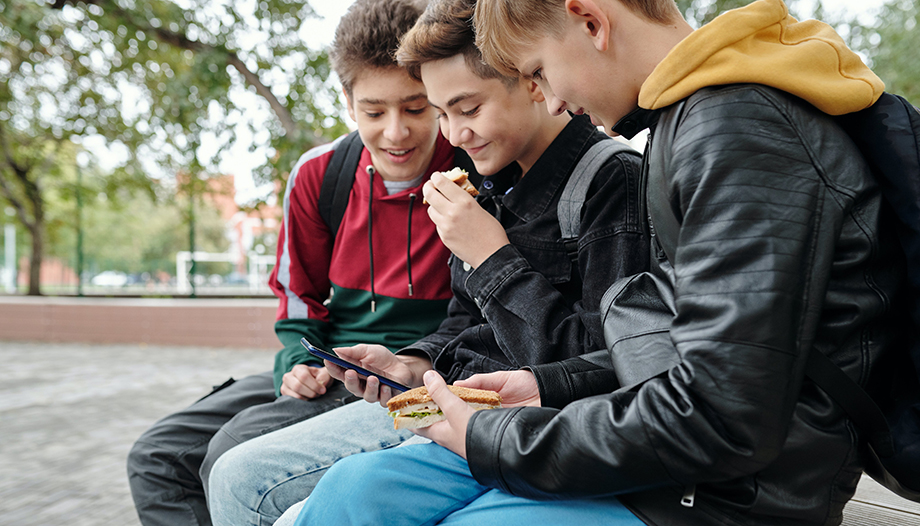"If your friends jump off a bridge, will you jump off too?" was one of the old phrases of a mother worried about the bad habits of an impressionable child. Today it is parents and grandparents who push their children and grandchildren off a bridge so that they are no different. What has happened to us?
It is of little or no use to cite data linking the use of cell phones with an increase in suicides and self-harm by adolescents, of little or no use to explain how the inappropriate use of these devices is behind the growing numbers of addiction to pornography or gambling, bullying, self-perception problems or sexual abuse. There will always be some specialist around who will downplay the risks and claim that children need to be socialized and have freedom. The mention of this last term immediately causes even the most responsible parents to compromise with the most suspicious habits and customs, lest they be labeled as authoritarian.
So, under the banner of this supposed freedom, we have generous parents and grandparents lavishing love on their grandchildren and buying them for their communion a latest generation 5G padlock with a 30 megapixel camera and a 5,000 microampere battery, lest they run out in the middle of the day. I say "padlock" because these devices are designed as such, to imprison our freedom and tie us the more hours the better to the universe of services they offer us.
Many of the best mathematicians, psychologists, neuroscientists and engineers in the world (in the free world and in the totalitarian dictatorships that give our children the apps that limit theirs) work night and day to achieve more addictive applications, more suitable to override our ability to decide, because their business is our time in front of the screens.
When I see a gang of pre-adolescents on the street, all with their cell phones in their hands, hardly talking to each other, I can't help but remember that scene that I'm sure you've seen in some documentary, of the herds of wildebeest crossing the crocodile-infested Mara River. Being, as wildebeests are, gregarious animals, every year the crocodiles just have to wait quietly for the leader of the herd to enter the river to feast, because all the others will come behind in single file, without hesitation. Maybe one of the youngsters in that gang had no need to enter the river through that ford, maybe he could have waited for some time yet, maybe he could have looked for another area with less hungry carnivores, but he is forced to pass by everyone because he is less afraid of the crocodile than he is of getting out of the herd. One of the most terrible scenes of the documentary is when one of the wildebeest calves is caught by the snout between the jaws of one of the huge reptiles before the resigned gaze of his mother who flees trying to save herself and not to lose the rhythm of the group.
Returning to the human world, there are already many parents who are waking up and who can no longer stand to watch, like a mother wildebeest, how others eat up their children. Groups of parents have emerged who are encouraging each other to restrict the use of cell phones by their children until an age when they can be the ones to dominate the device and not vice versa, as has been the case up to now. These are not particularly religious or ideological groups. They are groups, we could say, that are simply trying to recover common sense.
The Christian faith has always been a help for parents when it comes to not losing that common sense that protects those who exercise it from strange influences or passing fashions. The Gospel has universal guidelines that serve for families of all times and cultures, and knowing that they are loved by God has traditionally given parents a plus, since they do not have to seek the protection of social recognition, but are able to live against the tide and without fear.
To educate children in freedom is to go against the current, because true freedom does not consist of doing what one wants to do at any given moment, but what is convenient for one to get closer to God, who is the source of human happiness. And God, unfortunately, is not among the topics most recommended by influencers. This is the reason why many Christian families are affected by the phenomenon of worldliness, which consists in living like everyone else, like those who have no hope.
Pope Francis said that "worldliness is probably the worst thing that can happen to the Christian community" and, warning about the dangers of doing what everyone else is doing, he affirmed that "it is hard to go against the current, it is hard to free oneself from the conditioning of common thought, it is hard to be set aside by those who 'follow the fashion'", and he invites us to ask ourselves: "What am I afraid of? Of not having what I like? Of not reaching the goals that society imposes? Of the judgment of others? Or rather, of not pleasing the Lord and not putting his Gospel in the first place?
A good string of questions to ask ourselves today as we contemplate how the crocodiles on duty continue to lie in wait for a new herd of tender adolescent wildebeest that have already asked to cross the river for Christmas.
Journalist. Graduate in Communication Sciences and Bachelor in Religious Sciences. He works in the Diocesan Delegation of Media in Malaga. His numerous "threads" on Twitter about faith and daily life have a great popularity.







